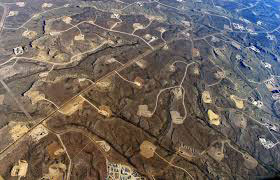Colorado is the first state to move on preventing methane releases from oil and gas drilling with regulations proposed this week.
The primary component of natural gas, methane emissions are rising as fracking operations spread rapidly across the state.
"The rules will help Colorado prepare for anticipated growth in energy development while protecting public health and the environment," says Governor Hickenlooper. "They represent a significant step forward in addressing a wider range of emissions that before now have not been directly regulated."
Notably, companies will have to actively detect and repair methane leaks at wells, in above-ground pipelines and at compressor stations.
Since testing for methane involves measuring volatile organic compounds (VOCs) – high VOCs indicates greater methane emissions – air pollution from chemicals will also be reduced.
Monitoring requirements will be based on how many tons of VOCs a company produces each year. Bigger polluters will have to monitor more often for leaks, which would have to be fixed within 15 days. Companies have to report leaks to state inspectors and have to allow them to inspect facilities to make sure leaks are repaired.
Colorado regulators developed the regulations in concert with three major oil and gas companies – Noble Energy, Encana and Anadarko – and environmental nonprofit, Environmental Defense Fund.
"This proposal represents a model for the nation," says Fred Krupp, president of Environmental Defense Fund.
Public comments are being accepted for 90 days, and a public hearing will be held in February.
Fracking pads:

In this year’s elections, three Colorado towns approved fracking bans and the vote is so close in a fourth town that it is still undergoing recounting.
The region has been inundated with 51,000 gas and oil wells – just over the past four years – with an end nowhere in sight. The industry is investing billions to expand, including drilling near neighborhoods and rivers. There are daily spills, contaminating soil and water, and air pollution has become a major problem.
Methane is 25 times more potent than carbon on a pound-for-pound basis as a greenhouse gas and climate-change forcer.
The report, Leaking Profits, shows that oil and gas companies can cut methane emissions 80% at a profit, using available technologies that would add $2 billion a year to the industry’s bottom line. That would reduce US methane emissions by a third – equal to closing 50 coal-fired power plants.
Without capturing methane, natural gas is dirtier than coal in terms of greenhouse gas emissions. Read our article, Methane Leaks From Natural Gas Production Higher Than Anticipated.
